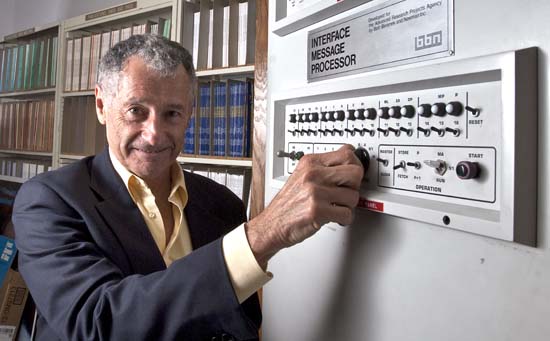School of Engineering at UCLA celebrates 40th anniversary of the Internet’s creation

Computer science Professor Leonard Kleinrock was on the team that sent the first host-to-host message from UCLA to the Stanford Research Institute.
By Areim Omar
Oct. 29, 2009 12:24 a.m.
A press release dated July 3, 1969, illustrated goals of what the founders of the Internet hoped it would achieve.
The description of the original Internet was strikingly accurate to what it is today, with the prediction that it would link different computers on one intricate network and be as easy to use as the telephone or electricity.
The UCLA Henry Samueli School of Engineering and Applied Science will celebrate the 40th anniversary of the creation of the Internet by hosting a symposium at Covel Commons today.
The event marks the birth of the Internet, considered to be Oct. 29, 1969, when the first host-to-host message was transmitted from UCLA to the Stanford Research Institute. The UCLA team was led by computer science Professor Leonard Kleinrock.
To celebrate the anniversary, the forum will consist of speakers prominent in the cyber and Internet arena who will provide commentary on the future of the Internet and ideas about what the world should expect from it. The symposium’s keynote speaker is Nicholas Negroponte, founder and chairman of One Laptop per Child, a nonprofit organization, and chairman emeritus of MIT Media Laboratory.
“(The event’s) basic function is to recognize the 40th anniversary and to engage discussion. … It is not going to be on history or technology, but on the impact on pop culture, its implications, its ubiquity … issues that are more important for the end-users rather than the engineers,” Kleinrock said.
The event also serves as a way to put the School of Engineering on the map.
“It is an exciting day for the school and the visibility of the school. Although small, the School of Engineering has been huge in the development of new technologies,” said Vijay Dhir, dean of UCLA’s Henry Samueli School of Engineering and Applied Science.
Because of the vast variety in speakers, Kleinrock anticipates an equally diverse, and perhaps controversial, discussion. Issues that will be tackled at the symposium include generation gaps, the uses of the Internet, privacy conflicts and the various grassroots efforts that have been set in motion, Kleinrock said.
“The Internet has changed everything and is still changing everything, whether it is newspapers going online, shopping, Facebook. … All of these forms of human activity are changing in ways that we don’t quite understand. It makes doing business significantly easier and more productive and is clearly the environmental way to go,” said Josh Green, member of Mohr Davidow Ventures investing team, and a UCLA alumnus.
Although the significance of the Internet might not have been foreseen, Kleinrock projected the popularity and effect that the Internet would have.
“As of now, computer networks are still in their infancy, but as they grow up and become more sophisticated, we will probably see the spread of computer utilities, which, like present electric and telephone utilities, will service individual homes and offices across the country,” Kleinrock said in a statement.
But, the one aspect that he did not predict was the social side of the Internet.
“It is about people talking to people. I realized it when e-mail took over the network traffic in 1972. … The Internet has been a wonderful democratizing tool. It allows a person of any race, any gender, any religion, any social class to have a different voice, and thereby allow the sense of crowds and large numbers of people to express themselves,” Kleinrock added.
Despite the positive implications of the Internet’s development, there is a negative aspect to such an open network, which Kleinrock calls “the dark side of the Internet.” Because the Internet was created so openly, pornography and pedophilia can easily be found there. The solution to these issues lies in the user.
“The solution is social responsibility. We all have to assume responsibility as both consumers and creators,” Dhir said.
The future of the Internet is still unclear, but predictions can be made. With developments, the Internet’s future may lie in imbedded technology.
Cyberspace will be taken from its current position, behind a computer screen, and expand out into the physical environment. Instead of having to sit down at a computer to use the Internet, the complex system will be accessible on the streets, in walls of rooms, and fingertips, Kleinrock said.
“Once we create a pervasive global nervous system, it will be wherever we go, customized to our own individual needs,” Kleinrock said.
The question of whether people will buy into this notion of physical cyberspace is one with no certain answer, but Kleinrock is hopeful.
“There is a natural inertia on the part of humans to accept new technology,” Kleinrock said.
Because of the growth and expansion of the Internet over the years, humans are predicted to welcome the even further development of new technologies.
Thus the forum will serve not only as a commemoration of 40 years of technological progress, but also as a glimpse into the future.
“It is a tribute to Leonard Kleinrock … as well as an opportunity for us to say thank you and a real opportunity to see what the next 40 years will bring,” Green said.


